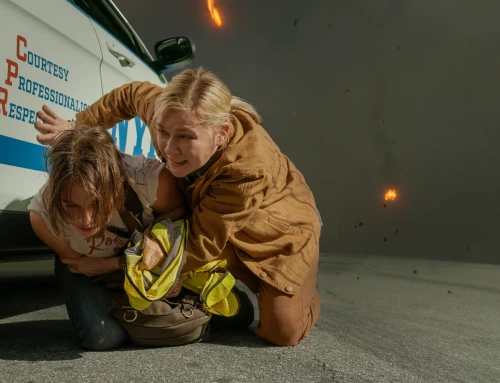The timing for a film like “The Last Black Man in San Francisco” is right. Cities like San Francisco across American have been changing, due to mass migration along with the influx of banks and other forms of big money coming in and buying large sums of land and neighborhoods and rebuilding them for more commerce and real estate. The result leads to displacement of citizens who have lived in these communities their whole lives, and even their generations of parents and grandparents lived their before them.
We are told that if you work hard enough, sacrifice enough, you can buy land. With the collusion of government and big banks that led to the housing crash in 2008, where true capitalism is destroyed by corporatism and crony capitalism, and the bigger banks and real estates along with the politicians who write the laws are the big winners.
Director Joe Talbot, co-writing the script with the films lead actors Jimmie Fails and Rob Richert is a love letter to San Francisco and a cautionary tale about gentrification and the struggles it creates for its native citizens and community. The film centers on a house in San Francisco that Jimmie’s grandfather built after World War 2, a beautiful house with a Victorian structure that holds great space and beautiful details. During the 1990’s Jimmie father (Rob Morgan) lost the house. Years later, Jimmie and his best friend Mont (Jonathan Majors) stop in the vacant house to touch up the exteriors, and eventually they end up breaking into the home, cleaning the interiors, and ultimately moving in and living inside it as it stays vacant.
There also many supporting characters that appear in just a handful of scenes, one centers on Danny Glover as the grandfather, we see a preacher (Willie Hen), a scene of Jimmie’s father Bobby (Rob Morgan) who packages and peddles pirated dvds of big movies, and a man living in his car all conveys the displacement of the cities transformation, and Thora Birch makes a cameo where she is trashing the city of San Francisco where Jimmie tells her she doesn’t have a right to trash it. The biggest set-back of the film is the clunky script, where narrative coherence is taken the back seat to visual poetry, and while the film certainly holds visual splendor with many engaging moments, it feels like it coasts along with hypnotic imagery becomes weary after a while. That is perhaps because at its core there isn’t really much complexity to dissect here, or really much of a narrative that really doesn’t have much at stake when it comes to characterization or dramatic momentum. With it running a full two hours, that is problematic. Had the film been trimmed down to 90 or even 100 mins mark, it would probably play out like a beautiful and elegiac tone poem with its ideas and themes.
The woozy imagery is captured with beautiful cinematography by Adam Newport-Berra, and Talbot stages his scenes with wide lens and symmetry that echoes the aesthetics of Wes Anderson, and Majors and Fails do first-rate work in their performances. The subject matter of the film is indeed involving, however the forced David Gordon Green (earlier work) and Wes Anderson style makes the film feel too forced and at times pretentious.
Despite some of these flaws, there is no denying just how melancholic the film is on the past and on gentrification. I commend Talbot and writers for not making a too heavy-handed of film about the reasons why gentrification occurs from the housing market, and it also doesn’t beat you over the head about racism, but the presence of racism is clearly there, and its mostly from people and cities who believe or claim they are the most tolerant and accepting.
All around “The Last Black Man in San Francisco” holds a lot of poignancy and heartbreak that is all around just very sad. It doesn’t offer simplistic solutions, it just shows how the fruits of ones labor and the hard-work we hold can slip away within us at any given time. There is nothing sadder then not gaining acceptance from your own community and this films captures that with sincerity and poignancy.









2583 82207Looking forward to look you. 509794
5781 477390This put up is totaly unrelated to what I used to be seeking google for, nonetheless it was indexed on the first page. I guess your performing something right if Google likes you adequate to spot you at the first page of a non related search. 496164
710906 132794Some actually excellent info , Gladiola I discovered this. 385369
549752 658690Now im encountering a fresh short troubles Once i cant look like allowed to sign up for the specific give food to, Now im utilizing search engines like google audience. 47697
298269 862036Have you noticed the news has changed its approach lately? What used to neve be brought up or discussed has changed. Its that time to chagnge our stance on this though. 810635
743221 153034Excellent blog here! Also your web site loads up quite quick! What host are you utilizing? Can I get your affiliate link to your host? I wish my website loaded up as quickly as yours lol xrumer 320446
898608 107901I like this web site quite considerably so considerably superb info . 788306
342436 152767Glad to be 1 of a lot of visitants on this awing internet internet site : D. 535507
711157 793878camping have been the top activity that we can have during the summer, i really like to roast marshmallows on a campfire` 887874
841497 921370Spot up for this write-up, I seriously believe this web site needs a whole lot a lot more consideration. Ill apt to be once more to learn additional, appreciate your that information. 585672
21496 197908An attention-grabbing discussion is worth comment. I believe that you really should write a lot more on this matter, it wont be a taboo topic nonetheless usually persons are not sufficient to speak on such topics. To the next. Cheers 905798
921827 886976Nice site. On your blogs extremely interest and i will tell a pals. 836029
12835 791735You produced some decent points there. I looked on the net to the concern and discovered most people goes together with along with your internet site. 439768
346611 916882Safest the world toasts are created to captivate and also faithfulness to your wedding couple. Beginner sound system watching high decibel locations would be wise to always remember some sort of vital secret created by presentation, which is your auto. best man speeches funny 506723
Pretty part of content. I simply stumbled upon your website and in accession capital to assert that I acquire in fact loved account your blog posts.
Anyway I’ll be subscribing in your feeds and even I fulfillment you
get right of entry to consistently rapidly.
I have learn some good stuff here. Certainly
price bookmarking for revisiting. I surprise how a lot effort you place to
create this sort of fantastic informative web site.
Hi, i think that i saw you visited my web site thus i came to “return the favor”.I’m attempting to find things
to enhance my website!I suppose its ok to use some of your ideas!!
720885 214881Hello, Neat post. There is an issue along with your web site in web explorer, could test thisK IE still could be the marketplace leader and a huge portion of other individuals will miss your magnificent writing because of this problem. 212256
954104 497285Thank you for your quite great data and feedback from you. car dealers in san jose 327593
24949 14979Hello! I could have sworn Ive been to this site before but after browsing through some with the post I realized its new to me. Nonetheless, Im definitely pleased I found it and Ill be book-marking and checking back often! 464217
839954 293631Really clear website , regards for this post. 971221
65654 878641You designed some decent points there. I looked on the net for any dilemma and located most individuals goes along with together together with your website. 370995
794660 473124Thanks for the blog loaded with so several details. Stopping by your blog helped me to get what I was looking for. 918309
You could definitely see your expertise within the article you write. The arena hopes for even more passionate writers such as you who are not afraid to mention how they believe. All the time follow your heart.|